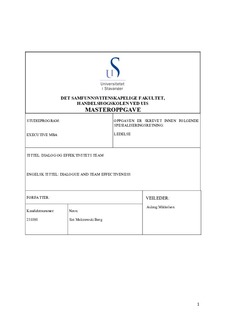Dialogue and effectiveness
Master thesis
Permanent lenke
http://hdl.handle.net/11250/2568503Utgivelsesdato
2018-05-25Metadata
Vis full innførselSamlinger
- Studentoppgaver (Business) [1035]
Sammendrag
Due to the development and demands of globalisation and the need to quickly adapt to changes, companies have been forced to change their organisational structures. Organisation in teams is seen as a powerful tool for high performance. However, simply putting individuals together in teams, without nurturing the team, does not make them more effective. Despite this, many employees and leaders do not take the time to develop a well-functioning team. There are different models to test effectiveness, but fewer on how to improve effectiveness. Dialogue, as a special way of communicating in teams, have been suggested by experts in the field to be an important predictor of effectiveness as early as the 1970s. Yet very few researchers have looked into this. Bang and Midelfart (2010) offer the first study to test specifically if dialogue is positively correlated with effectiveness in leader groups. They found that dialogue is an independent factor in predicting effectiveness. Inspired by this, the purpose of this thesis was to see if dialogue correlates positively with effectiveness in different teams. The number of participants is 104. They come from 16 teams, representing 10 different organisations. All were given the same survey as the original study. The results are strikingly similar. Dialogue has a strong positive correlation with effectiveness. Furthermore, the results on all three measures of effectiveness has a strong correlation with dialogue, which is in line with the findings of the original study.
Beskrivelse
Master's thesis in Business administration: Executive MBA

